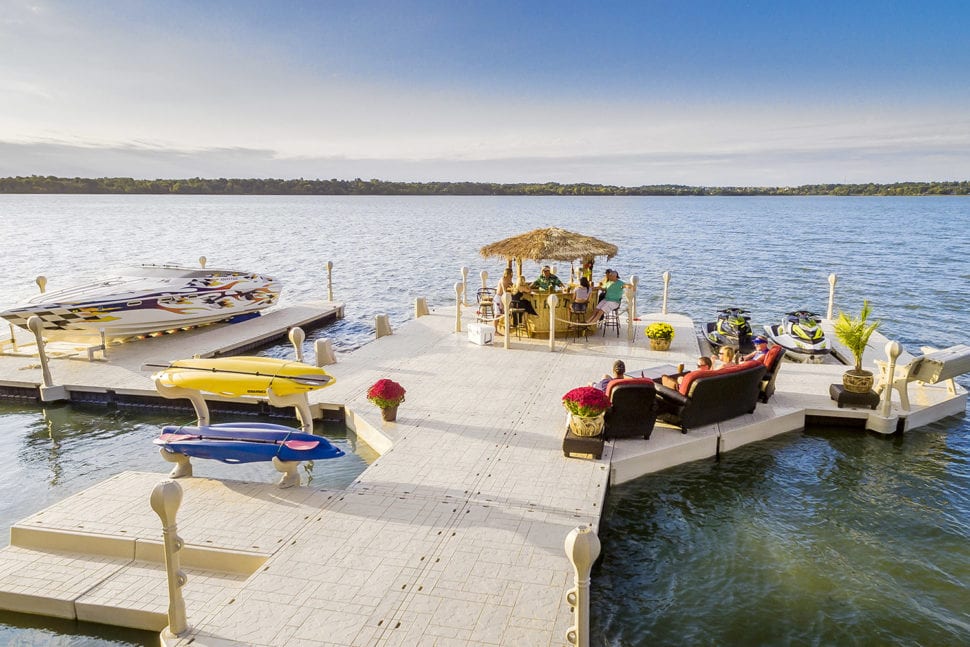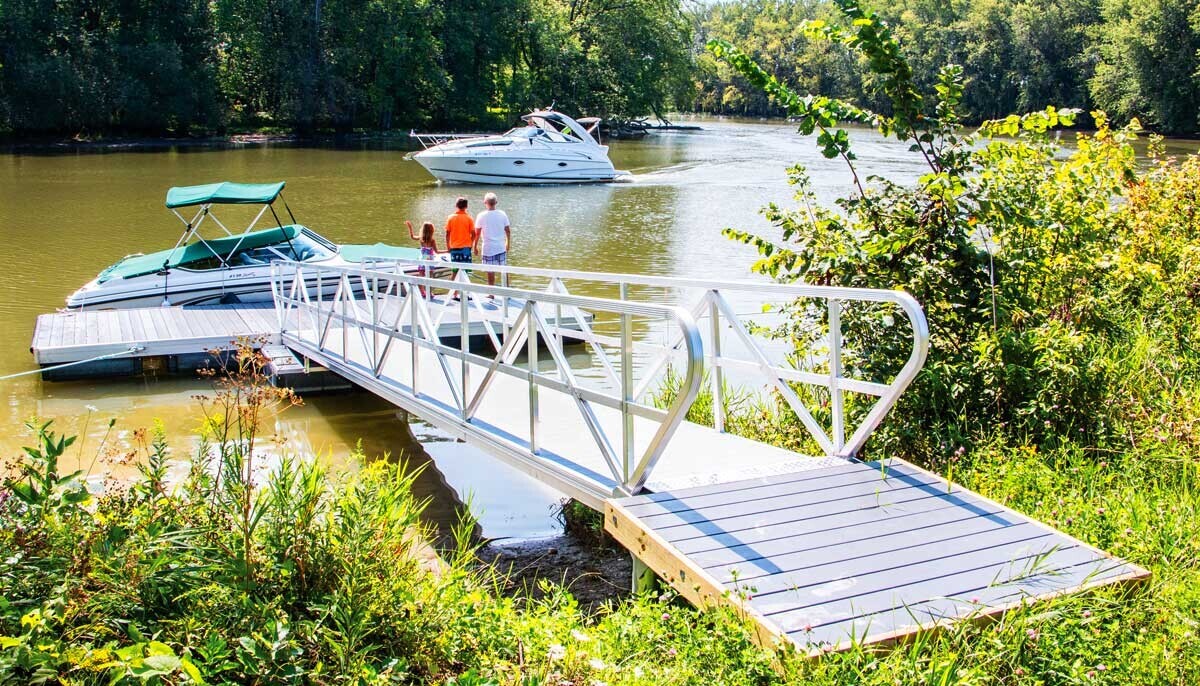The Importance of High Quality in Floating Dock Builder Selection for Resilient Docks
The Importance of High Quality in Floating Dock Builder Selection for Resilient Docks
Blog Article
Why Floating Docks Are the Perfect Option for Your Waterfront Needs
Floating docks present a compelling service for beachfront needs, especially due to their versatility to varying water degrees and their durable, modular layout. These frameworks not just enhance functionality for both recreational and commercial functions however likewise use personalization choices tailored to specific needs. In addition, their eco pleasant materials add to sustainability efforts. As we check out the multifaceted advantages and applications of floating docks, it ends up being evident why they attract attention in the world of waterfront infrastructure-- especially when taking into consideration the long-term benefits they offer numerous stakeholders.
Trick Advantages of Floating Docks
The convenience of floating docks deals countless benefits for beachfront applications, making them a significantly popular choice among marina drivers and property programmers. Among the primary benefits is their versatility to fluctuating water degrees, which enables them to stay practical in various settings, consisting of lakes, rivers, and coastal areas. Unlike standard set docks, floating docks can fall and rise with the trends and seasonal changes, guaranteeing consistent ease of access.
Furthermore, floating docks are commonly much easier and more economical to maintain and set up. Their modular layout helps with quick assembly, reducing labor costs and building and construction time. The products utilized in floating dock construction are frequently resistant to corrosion, making certain longevity with very little upkeep.
Safety is an additional key benefit; the resilient nature of these docks minimizes the risk of crashes during boarding and getting off, making them especially appealing for family-oriented centers. Their ecological influence is lower than that of set structures, as they do not interfere with aquatic environments. Collectively, these benefits setting floating docks as a superior service for a series of waterfront requirements, straightening with both operational efficiency and eco-friendly factors to consider.
Suitable Applications for Various Tasks
Adaptability is a hallmark of floating docks, making them ideal for a variety of activities across various waterfront settings. These functional structures can act as optimal platforms for leisure tasks such as boating, angling, and swimming. Their buoyant nature allows for simple access to watercraft, allowing smooth embarkation and disembarkation, while additionally providing a stable area for anglers to cast their lines.
In industrial settings, floating docks facilitate the loading and dumping of goods, suiting both small and huge vessels. They are specifically beneficial in locations with changing water degrees, making sure that operations continue to be continuous. Furthermore, floating docks can be used for waterside eating and home entertainment, supplying a one-of-a-kind and scenic experience for customers.
Environmental applications are additionally significant; floating docks can work as monitoring systems for wild animals enjoying or as docking stations for research vessels engaged in eco-friendly studies. As marina developments become extra prevalent, these docks offer a sensible option for boosting ability without substantial land alterations. Ultimately, the adaptability of floating docks makes them a recommended choice for anyone looking for reliable and functional waterfront services.
Style and Personalization Options
Floating docks not just cater to varied tasks but additionally use a variety of design and personalization options that improve their performance and aesthetic appeal. These versatile frameworks can be customized to fit particular waterfront demands, whether for household, business, or recreational purposes.
One trick aspect of customization is the selection of materials. Options range from high-density polyethylene to light weight aluminum, each offering special benefits in terms of longevity and upkeep. In addition, the configuration of the dock can be adjusted to match numerous water degrees and ecological problems, ensuring security and safety.
Layout functions can include incorporated seating, barriers, and lights, which not only enhance usability but also improve the appearance of the dock. Custom colors and finishes enable owners to match the dock with existing frameworks or individual choices, creating a natural search for the beachfront.
Additionally, floating docks can be made with modular areas, making it possible for very easy expansion or reconfiguration as needs change. This flexibility is specifically important for growing families or advancing companies. In general, the substantial design and customization choices readily available make floating docks an extremely adaptable solution for any type of waterside setup.
Setup and Upkeep Factors To Consider
Normally, successful setup and maintenance of floating docks need careful planning and interest to information. Prior to starting installment, it is vital to evaluate the details site conditions, consisting of water deepness, wave activity, and local guidelines. This initial evaluation notifies the choice of products and design, making certain the dock will stand up to ecological stress and anxieties.

Maintenance is similarly crucial to lengthen the life-span of the dock. Routine evaluations must be performed to determine deterioration, particularly on flotation devices, ports, and decking. Cleaning the dock periodically aids stop the accumulation of algae and debris, which can compromise surface area honesty and visual appeals.
In addition, seasonal prep work, such as getting rid of accessories and safeguarding the dock throughout severe weather condition, can avoid damage. By focusing on appropriate setup and regular maintenance, proprietors can ensure their floating dock remains a dependable and functional waterfront option for years ahead.

Environmental Influence and Sustainability
The ecological effect of floating docks is an essential factor to consider for waterfront jobs, as these frameworks engage directly with marine ecosystems. floating dock company. Unlike conventional fixed docks, floating docks decrease disturbance to the substratum, enabling all-natural sediment activity and decreasing disintegration. Their this content layout enables water flow below, promoting healthy water atmospheres and supporting regional wildlife
Several floating docks are built wikipedia reference from sustainable products, such as recycled plastics and environment-friendly composites, which decrease the carbon footprint connected with production. Moreover, contemporary layouts include features that improve environmental sustainability, such as absorptive surfaces that assist in water filtering and reduce air pollution.
Floating docks also offer an excellent system for habitat remediation by supporting the growth of water vegetation and offering sanctuary for fish and other marine organisms. By including attributes like fish habitats and submerged growings, floating docks can boost biodiversity in the location.
On top of that, these frameworks can be designed to accommodate solar panels, offering sustainable energy alternatives that additionally reduce their ecological influence (floating dock builder). In general, floating docks represent a lasting service that balances human use beachfronts with the preservation of essential environments
Final Thought
To conclude, floating docks present a very adaptable and lasting solution for diverse waterside requirements. Their modular style, combined with making use of sturdy, corrosion-resistant products, makes sure durability and convenience of maintenance. The flexibility of floating docks suits numerous applications, varying from entertainment activities to commercial procedures while reducing ecological impact. Eventually, the adjustable functions and capability for development further solidify floating docks as a suitable selection for any type of beachfront task.
Floating docks existing an engaging service for waterfront demands, especially due to their flexibility to rising and fall water degrees and their durable, modular layout. Unlike conventional fixed docks, floating docks can view website climb and fall with the tides and seasonal changes, guaranteeing constant access.
Jointly, these advantages placement floating docks as a superior option for a range of waterfront demands, lining up with both operational effectiveness and ecological factors to consider.
In general, the extensive layout and customization options offered make floating docks an extremely adaptable remedy for any type of waterfront setting.
Unlike conventional set docks, floating docks reduce interruption to the substratum, permitting for natural debris activity and reducing erosion.
Report this page